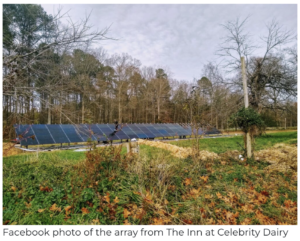Renewable Energy: Direct Assistance From NCSU Clean Energy Center to Farmers on Transition Toward Energy Independence
go.ncsu.edu/readext?1012670
en Español / em Português
El inglés es el idioma de control de esta página. En la medida en que haya algún conflicto entre la traducción al inglés y la traducción, el inglés prevalece.
Al hacer clic en el enlace de traducción se activa un servicio de traducción gratuito para convertir la página al español. Al igual que con cualquier traducción por Internet, la conversión no es sensible al contexto y puede que no traduzca el texto en su significado original. NC State Extension no garantiza la exactitud del texto traducido. Por favor, tenga en cuenta que algunas aplicaciones y/o servicios pueden no funcionar como se espera cuando se traducen.
Português
Inglês é o idioma de controle desta página. Na medida que haja algum conflito entre o texto original em Inglês e a tradução, o Inglês prevalece.
Ao clicar no link de tradução, um serviço gratuito de tradução será ativado para converter a página para o Português. Como em qualquer tradução pela internet, a conversão não é sensivel ao contexto e pode não ocorrer a tradução para o significado orginal. O serviço de Extensão da Carolina do Norte (NC State Extension) não garante a exatidão do texto traduzido. Por favor, observe que algumas funções ou serviços podem não funcionar como esperado após a tradução.
English
English is the controlling language of this page. To the extent there is any conflict between the English text and the translation, English controls.
Clicking on the translation link activates a free translation service to convert the page to Spanish. As with any Internet translation, the conversion is not context-sensitive and may not translate the text to its original meaning. NC State Extension does not guarantee the accuracy of the translated text. Please note that some applications and/or services may not function as expected when translated.
Collapse ▲NC State University’s NC Clean Energy Tech Center (NCCETC, part of the NCSU’s College of Engineering) released this nice article on their work helping farmers and small businesses improve energy efficiency and transition power supply to clean energy sources.The NC CETC is actively engaging with North Carolina’s farming and rural communities with application assistance for funding to make such changes with REAP funds. The USDA Rural Energy for America Program (REAP) – with funds from the Inflation Reduction Act – provides grant funding and loan guarantees to agricultural producers and rural small businesses for renewable energy system (RES) and energy efficiency improvement (EEI) projects. Energy improvement technologies include solar, solar plus storage, wind, biomass, geothermal and hydrogen.
NC CETC is helping entities apply for funding to the REAP program through its technical assistance program. The Clean Power and Industrial Efficiency (CPIE) team is currently helping agricultural producers and rural businesses along their path to expanding energy independence and cost savings. For technical assistance from the CPIE team from NCCETC for a REAP assessment or for assistance with completing a REAP application, contact Art Samberg at asamber@ncsu.edu or at (919) 515-5959.
N.C. Cooperative Extension Specialist Debbie Roos (Chatham County) recently hosted a webinar on the REAP technical assistance program, that webinar recording and supporting materials can be found here.



